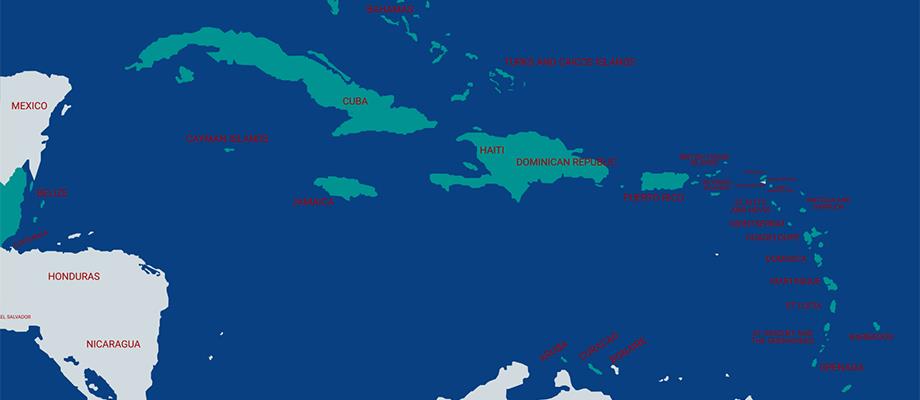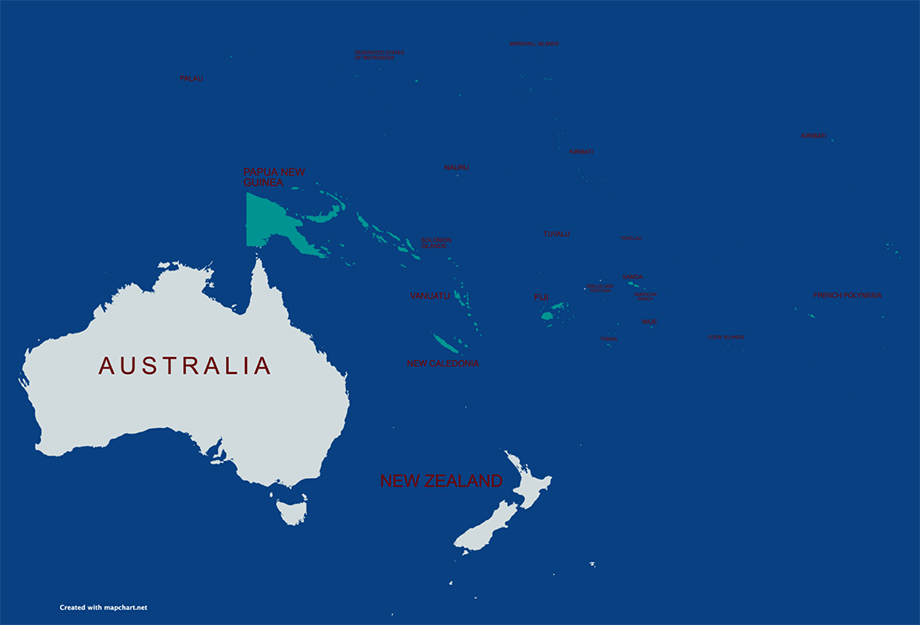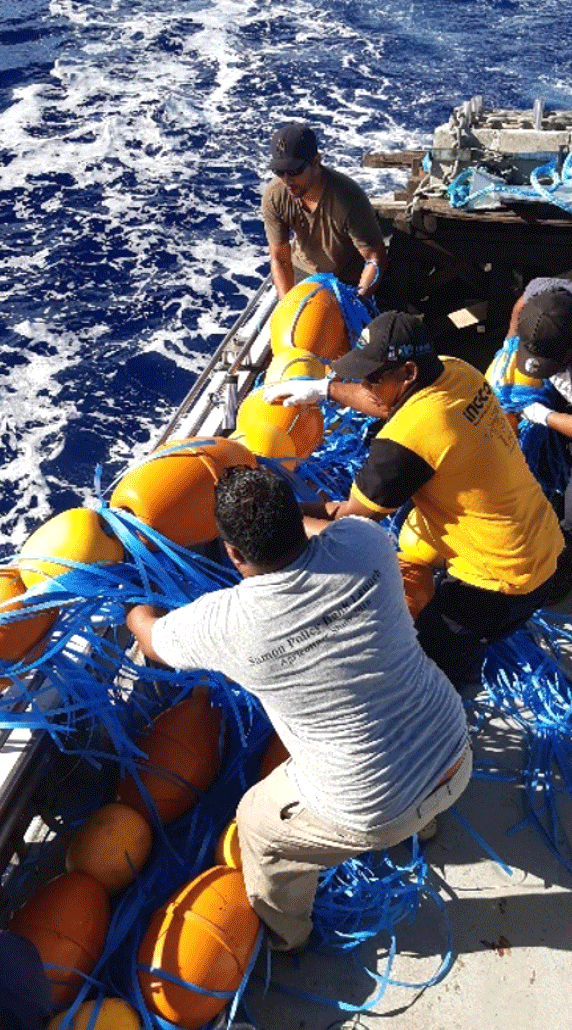The Implementation of the SSF Guidelines in Small Island Developing States

What are Small Island Developing States?
The world’s Small Island Developing States (SIDS) are a distinct group of 57 countries divided into three key regions: the Caribbean, the Pacific and what are collectively referred to as the African, Indian Ocean, Mediterranean and South China Sea (AIMS) SIDS (UN-OHRLLS, 2015). The United Nations Office of the High Representative for the Least Developed Countries, Landlocked Developing Countries and Small Island Developing States (UN-OHRLLS), estimates that 65 million people globally have their homes in SIDS (UN-OHRLLS, 2013). As isolated nation states, they have fostered their own cultural traditions and indigenous knowledge to conserve their natural systems. With limited arable land, many of these island systems are highly dependent on small-scale fisheries.
How do the SSF Guidelines support sustainable development in SIDS?
In the context of SIDS, FAO’s work on sustainable development is primarily framed by the Global Action Program on Food Security and Nutrition in Small Island Developing States (GAP) and encourages supporting the development of national implementation plans based on national capacities, priorities, needs, and condition. FAO’s GAP for SIDS is implemented using normative instruments such as the Voluntary Guidelines for Securing Sustainable Small-Scale Fisheries in the Context of Food Security and Poverty Eradication (SSF Guidelines). During the development of the SSF Guidelines, several SIDS took part in regional consultations. In the Caribbean, for example, 17 SIDS were invited to the 2012 regional consultation organised by FAO in collaboration with the Caribbean Regional Fisheries Mechanism. Likewise, during the workshop series, ‘Towards the Implementation of the SSF Guidelines’, 6 African SIDS from the Indian Ocean and Western Africa were present. More recently, 10 SIDS from the Pacific attended the 2019 ‘Pacific Regional Workshop on Exploring the SDG Target 14.b and its indicator 14.b.1’.
The Caribbean
The 29 Caribbean SIDS are home to approximately 44 million people (UNESA, 2019) (see Figure 1). As with all SIDS, the bulk of animal protein consumed in the Caribbean comes from fish and fishery products (FAO, 2019). In the Caribbean Community (CARICOM) countries alone, more than 124,842 people are directly employed in small-scale fisheries and aquaculture, with another 499,368 people working indirectly in fishing related activities including: processing, retail, boat construction and net repair (CRFM, 2016).
Patrick McConney, Director at the Centre for Resource Management and Environmental Studies (UWI-CERMES) and co-coordinator of the Gender In Fisheries Team (GIFT), a regional research initiative led by the department which is based at the University of the West Indies (UWI) in Barbados, explained that people often make the “tacit assumption that [SIDS and the SSF Guidelines] are intrinsically linked”. During the formulation of the SSF Guidelines, prior to their endorsement, the Caribbean region engaged in both the 2010 ‘Latin American and Caribbean Regional Consultations on securing sustainable small-scale fisheries’ and the 2012 ‘Caribbean Regional Consultation on the development of international guidelines for securing sustainable small-scale fisheries’. Since the SSF Guidelines were endorsed at the 33rd Session of the Committee on Fisheries (COFI) in 2014 a number of institutions – including the Caribbean Natural Resources Institute (CANARI), the Caribbean Network of Fisherfolk Organisations (CNFO), the Caribbean Regional Fisheries Mechanism (CRFM) and the UWI-CERMES - operating throughout the Caribbean, have been integral to the development and execution of projects relating to the implementation of the SSF Guidelines.
 Figure 1 – Small Island Developing States in the Caribbean (map does not include Suriname or Bermuda) Figure 1 – Small Island Developing States in the Caribbean (map does not include Suriname or Bermuda) |
The cornerstone policy document relating to the implementation of the SSF Guidelines and the sustainable management of small-scale fisheries in the Caribbean is the Caribbean Community Common Fisheries Policy (CCCFP), and specifically the ‘Protocol on securing sustainable small-scale fisheries for Caribbean community fisherfolk and societies’, that was endorsed by the 12th Ministerial Council of the CRFM in 2018. The protocol explicitly requests the participating parties to incorporate the SSF Guidelines into the policy, and into programs, plans and other initiatives of their fisheries authorities and competent agencies, with special attention to gender equality, equity and human rights-based approaches. The protocol was made effective immediately and various small-scale fishery networks have been attending to its application across the region.
The SSF Guidelines are designed as a voluntary tool for marine and inland small-scale fisheries that should be applied and interpreted to reflect local, national or regional circumstances. As Nadine Nembhard, Administrative Assistant at the CNFO, explained, “the SSF Guidelines go a long way in terms of providing a formal space for small-scale fisheries on the international stage, and all that Caribbean communities have done is tailor them to the Caribbean region. We hope that we can continue to tailor these to the diverse cultures, societies and politics of each country”.
The CNFO is a network of small-scale fisherfolk and their organisations, operating in the CARICOM and has taken the lead in developing the forthcoming ‘Regional Code of Conduct for Caribbean Fisheries’. This Code, partially inspired by the FAO Code of Conduct for Responsible Fisheries and incorporating the recommendations of the SSF Guidelines, was posited by the ongoing FAO project funded by the Global Environment Facility (GEF), entitled the StewardFish project. The StewardFish project is part of the 10-year Strategic Action Program for the Sustainable Management of the Shared Living Marine Resources of the Caribbean and North Brazil Shelf Large Marine Ecosystems (CLME+ SAP) within seven CRFM Member States by empowering fisherfolk throughout fisheries value-chains to engage in resource management, decision-making processes and sustainable livelihoods with strengthened institutional support at all levels.
This new regional Code of Conduct is premised on the need to operationalise the Ecosystem Approach to Fisheries (EAF) at the regional and national levels. It is designed for all persons working in the Caribbean fishing industry and outlines an iterative social learning process emphasizing industry engagement, formal endorsement, implementation and participatory monitoring and evaluation. This Code will be formally adopted in November at CNFO’s General Assembly. However, as CNFO has pointed out, it is important that the Code does not remain solely a conceptual exercise. Shelly Ann-Cox, a post-doctoral researcher working at CERMES, has been heavily involved in the development of the Code and believes that, “the most important next step would be to get endorsement at the CRFM Ministerial Council so that Ministers in the 17 member states will support the implementation of the Code’s principles as part of their national policies”.
At CERMES, for the past four years the GIFT has focused on the gender equality and equity component of the SSF Guidelines. Lisa Soares, a post-doctoral researcher at CERMES, explained that “the first and major challenge [GIFT] has is communicating and raising awareness about the SSF Guidelines and the subtleties of gender equity and equality throughout the Caribbean SIDS at both the government level and among the fishing communities of the Caribbean”. Despite the fundamental role small-scale fisheries and the women involved predominantly in the post-harvest sector play in the hearts and minds of Caribbean citizens, both the concepts embedded in the SSF Guidelines and the human rights-based approach to fisheries management are not always understood or known about among the actors of the small-scale fisheries landscape.
Consequently, GIFT is in the process of implementing an SSF Gender Communications Strategy and Plan to increase awareness of the importance of gender mainstreaming in SSF value chains as guided by the CCCFP SSF Protocol and recommended by the SSF Guidelines. Lisa Soares added that, “in an effort to forge effective collaboration across existing projects UWI-CERMES is currently executing one of the goals of the SSF Gender Communications Strategy and Plan to build on and synergize with the EAF Awareness Social Media Strategy Campaign of the StewardFish Project.” By fostering synergy and collaboration, the aim is to use social media and low-cost communication to increase awareness of gender in fisheries across the SSF Gender project and all related gender components of the StewardFish project.
Maria Pena, the GIFT co-coordinator, reflected that they are moving into a new phase. “We have been setting the groundwork for implementation through our policy work, and we’ve collected a bit of qualitative data over the past few years but more data are needed for broader and deeper application to specific segments of the fisheries value chain, and to the sector as a whole.” The International Year for Artisanal Fisheries and Aquaculture (IYAFA) due to be celebrated in 2022, is likely to prove the ideal platform to communicate and share the work of the Caribbean institutions. For one thing, during the 17th Session of the Western Central Atlantic Fishery Commission (WECAFC), held 15-18th July 2019, the Commission recommended that the IYAFA be used as an opportunity to consolidate activities with partners. FAO Sub-Regional Fisheries Officer for the Caribbean, Yvette Diei-Ouadi, who is helping to coordinate the Caribbean’s regional efforts to celebrate IYAFA, expressed with alacrity that, “IYAFA will be the zenith for showcasing the highly distributed and varied activities going on across the Caribbean to support the SSF Guidelines”, emphasizing the crucial need to put gender equality and “the promotion of good local fish food” at the forefront of the strategic actions for the IYAFA.
The Pacific
 |
"We live and breathe in SDG 14". This statement by Terry Opa from the Pacific Community (SPC) at a the 2019 FAO ‘Regional Workshop on Exploring Sustainable Development Goal Target 14.b and its Indicator 14.b.1’, held in in Fiji, summarized the importance SDG 14 plays in a region that consists of 98% of water. Covering over a third of the Earth’s surface, the Pacific Ocean is home to 2.3 million people and some of the world’s most fertile fishing grounds. The fishing industry contributes up to 10 per cent of the region’s total GDP. Of the total 2.4 million tonnes of tuna caught in the Western Pacific Ocean, 58 percent had been caught in the waters of Pacific SIDS. Despite these natural resource endowments, small-scale fisheries, which provide the primary or secondary source of income for up to 50 percent of households in the Pacific, often struggle to obtain a fair share of the benefits. Furthermore, the political recognition of the value of coastal fisheries to food security and livelihoods has often been weak and small-scale fishers and fishworkers are not always well represented in decision-making processes. These are becoming especially pertinent with coastal fisheries resources declining and the need for more effective fisheries management, worsened by the effects of climate change and natural disasters, putting their existence at risk.
In efforts to advance into a stronger, coordinated approach to securing sustainable coastal fisheries in the region, the SPC endorsed, ‘A new song for coastal fisheries – pathways to change: The Noumea Strategy’ during the ninth SPC Heads of Fisheries Meeting, held in Noumea, New Caledonia in March 2015. This regional policy document was developed by participants at a regional workshop on the future of coastal and inshore fisheries management that was held in March 2015. The workshop brought together representatives from fisheries and environment departments across 22 SPC member countries; coastal communities; four agencies of the Council of Regional Organisations in the Pacific; and non-governmental organisations. The Noumea Strategy reflects many of the same issues as the SSF Guidelines, and it has been suggested that implementation efforts will complement the recommendations of the SSF Guidelines. A technical paper will soon be available to further highlight linkages between regional policies and the SSF Guidelines, as well as institutional synergies for FAO and regional fisheries agencies such as the Pacific Community (SPC) to support small-scale fisheries. The Pacific has also developed Joint Action Framework for Food Security and Nutrition in the Pacific Islands (2018-2022), or the Pacific Food and Nutrition Framework, which serves to systematize implementation of the GAP within the Pacific Island region.
The FAO Subregional Office for the Pacific Islands (FAO SAP) provides support to the 14 Pacific Island FAO members of the region, aligning its activities dually with the priorities of The Noumea Strategy with FAO’s GAP. For example, these policy frameworks support upscaling the supply of tuna to domestic markets to help optimize food and nutrition security and livelihoods development. Small-scale fisheries targeting tuna commonly use fish aggregating devices (FADs), and FAO have sought to improve the management of FADs to help reduce fishing pressure in coastal areas. The project is funded by the Government of Japan and is operational in Fiji, Kiribati, Marshall Islands, Palau, Samoa, Tuvalu and Vanuatu. The project supports the establishment of appropriate small-scale fisher associations and cooperatives, capacity development for complementary or alternative livelihood opportunities such as post-harvest and value-adding activities, which are in tune with the SSF Guidelines. The project also builds upon ongoing regional collaboration towards improving nearshore FAD monitoring programs, including the development and trialing of regional FAD monitoring guidelines.
 Figure 4: Supporting FAD deployments in Samoa to assist small-scale fisheries in response to the COVID-19 pandemic (June 2020). Figure 4: Supporting FAD deployments in Samoa to assist small-scale fisheries in response to the COVID-19 pandemic (June 2020). |
Another priority area emulated by The Noumea Strategy and Global Action Program is gender equity and equality - in particular, women and youth. Chapter 8 of the SSF Guidelines, on Gender Equality and Equity, has provided an enabling platform through which a Handbook for Pacific gender and social inclusion in small-scale fisheries and aquaculture was published in 2019. The Handbook is an example of FAO’s continued support to ongoing collaboration with regional partners in addressing gender, social inclusion and human rights issues in small-scale fisheries and aquaculture. A new project on gender equality and climate change adaptation in small-scale fisheries will soon commence to support Fiji, Solomon Islands and Vanuatu. It will focus on strengthening climate change adaptive responses and resilience at the national level and with fishing communities, through a participatory and gender-sensitive approach.
Complementary to both the aforementioned projects, FAO is working to implement other areas of the SSF Guidelines, including strengthening community-based fisheries management (CBFM), which support community level governance and sustainable management of coastal resources. Support has been provided to countries to enhance the capacity and programs of national fisheries agencies in implementing their respective CBFM programs. Examples include the review of operating procedures for developing and implementing CBFM programs, as well as capacity building programs to improve CBFM awareness and the development of awareness materials. Importantly, trainings and knowledge-sharing forums have also been provided to empower local fishing communities in fisheries management, such as trainings in giant clam restocking and coral reef restoration in Samoa, as well as a national workshop for fishing communities and key stakeholders to share lessons learned that will strengthen the CBFM program in Tonga.
The Indian Ocean
The Indian Ocean is part of the group, ‘Atlantic, Indian Ocean and South China Sea (AIMS)’ SIDS, and includes the Maldives, the Seychelles, the Comoros and Mauritius. In 2016, FAO and the Indian Ocean Commission (IOC) hosted a regional workshop entitled ‘Towards the implementation of the SSF Guidelines in the Southern Africa and Indian Ocean Region’ (FAO, 2016). Among the vulnerabilities and challenges cited by participants, “poor organisational structures and lack of capacities to participate in decision-making” and the “need for better recognition of the role of both women and men along the small-scale fisheries value chain” were identified priorities for the region.
The ‘Regional Strategy for Fisheries and Aquaculture of the Indian Ocean Commission 2015-2025’ (IOC, 2018) aims at allowing the fisheries and aquaculture sector in IOC Member States to fully realise the potential contribution to sustainable and equitable growth in the region. The IOC strategy recognises the relevance of the SSF Guidelines for assisting Member States in reaching food security and poverty alleviation objectives. The European Union (EU) supports the IOC strategy through its ECOFISH program. One of the strategic actions of the program seeks to implement both the SSF Guidelines and the FAO Voluntary Guidelines on the Responsible Governance of Tenure of Land, Fisheries and Forests in the Context of National Food Security (VGGT), with an objective to provide equal access to productive fisheries resources and inputs, knowledge, financial services, markets and opportunities for value addition and employment (EU, 2018). This will be conducted in collaboration with the Federation of Small-Scale Fishers of the Indian Ocean (FPAOI). FPAOI is one of the collaborators in the program that will promote best practices for sustainable fishing, mangrove protection, deterrence and elimination of prohibited and harmful fishing gears should play a leveraging role in sustainable investments in fisheries. The FPAOI also recognises the important role the SSF Guidelines play in illuminating the role of women in small-scale fisheries.
